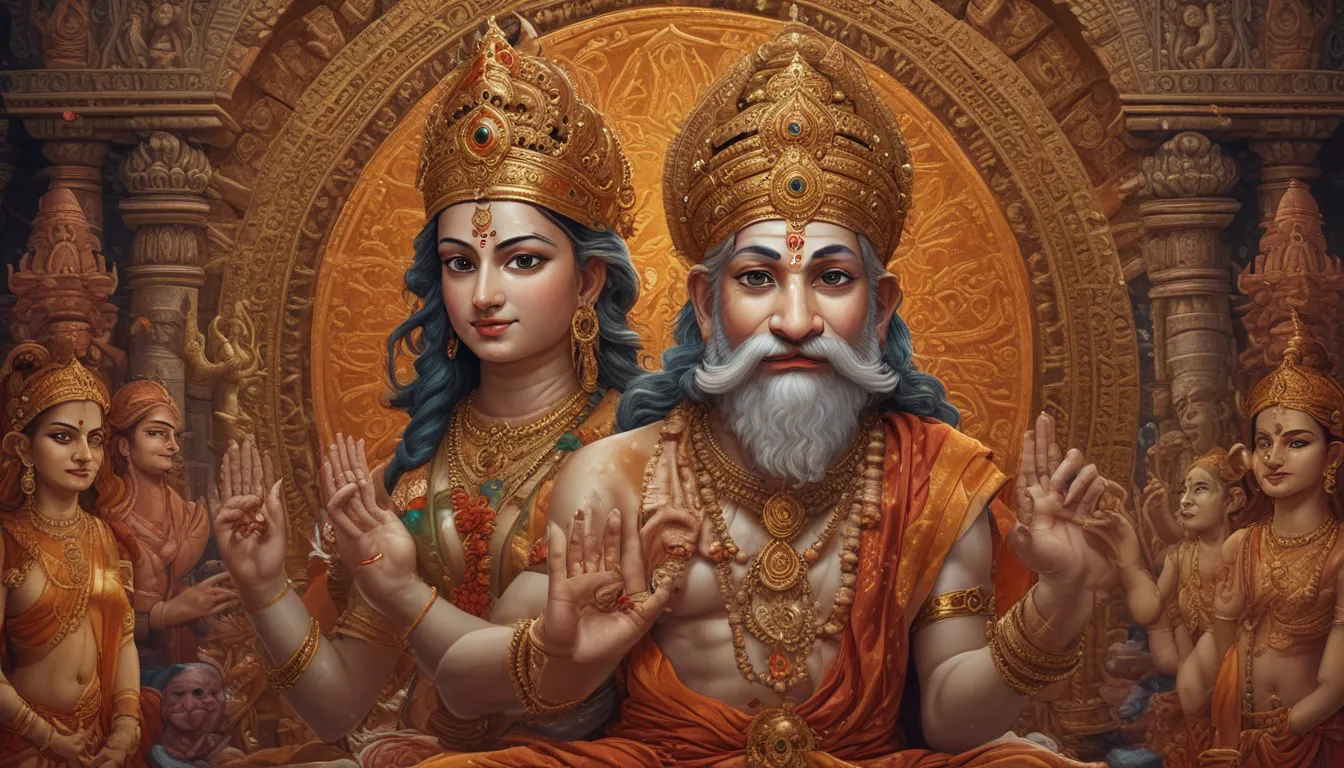The images in our articles may not match the content exactly. They are used to grab your attention, not to show the exact details in the text. The images complement the text but do not replace it.
Welcome to a fascinating journey through the rich and diverse world of Hinduism, one of the oldest and most diverse religious traditions globally. With over a billion followers, Hinduism holds the title of being the third-largest religion in the world. Its intricate tapestry of mythologies, rituals, and philosophies has intrigued and captivated individuals for thousands of years. From ancient scriptures to vibrant festivals, Hinduism offers a unique perspective on existence, the human experience, and the pursuit of enlightenment.
Unveiling 15 Intriguing Facts About Hinduism
Let’s delve into 15 intriguing facts about Hinduism that shed light on its history, beliefs, and practices. Each fact provides a glimpse into the multifaceted nature of this ancient religion and its profound impact on the lives of its followers.
1. Hinduism: The Third-Largest Religion Globally
With over 1 billion followers, Hinduism ranks as the third-largest religion worldwide, following Christianity and Islam. While a significant portion of Hindus reside in India, Hindu communities can be found across the globe, adding to the diversity and richness of the religion.
2. The Vedas: Ancient Hindu Scriptures
The Vedas, written in Sanskrit, encompass the Rigveda, Samaveda, Yajurveda, and Atharvaveda—forming the foundational texts of Hinduism. These scriptures contain hymns, rituals, and profound philosophical concepts that have shaped the beliefs of Hindu practitioners for centuries.
3. Diverse Deities in Hinduism
Hinduism’s polytheistic nature is evident in the worship of millions of deities. The trimurti, comprising Brahma, Vishnu, and Shiva, symbolizes the cosmic functions of creation, preservation, and destruction, respectively.
4. Karma: The Law of Cause and Effect
Central to Hindu philosophy is the concept of karma, which dictates that individuals are bound by the consequences of their actions. Good deeds lead to positive outcomes, while negative actions result in adversity, impacting future lives.
5. Moksha: The Quest for Spiritual Liberation
Hinduism emphasizes attaining moksha, liberation from the cycle of birth and death, through self-realization, knowledge, and ego dissolution. Achieving moksha involves merging with the divine and transcending earthly constraints.
6. Embracing Reincarnation
Reincarnation, a central tenet in Hinduism, posits that the soul is immortal and undergoes successive rebirths to achieve spiritual growth and ultimate liberation from the cycle of existence.
7. The Bhagavad Gita: A Spiritual Masterpiece
The Bhagavad Gita, revered as a sacred Hindu scripture, offers profound insights into various paths to spiritual enlightenment. It delves into themes of duty, moral dilemmas, and the nature of reality, guiding practitioners on their spiritual journey.
8. Holi: The Festival of Colors
Holi, a vibrant Hindu festival, heralds the arrival of spring with colorful celebrations, music, dance, and the throwing of vibrant powders. Symbolizing the victory of good over evil, Holi is a joyous occasion marking the onset of a new season.
9. Sacred Cows: Symbols of Divinity
Cows hold a revered status in Hindu culture, embodying divine and maternal qualities. Cow worship is deeply entrenched in Hindu traditions, with cow protection being a vital aspect of Hindu practices.
10. Architectural Marvels of Hindu Temples
Hindu temples are architectural delights, showcasing intricate carvings, grand structures, and awe-inspiring designs. From the iconic temples of Varanasi to the majestic temples of South India, these sacred sites pay homage to ancient artisans’ craftsmanship.
11. Yoga: A Path to Self-Realization
Originating in ancient Hindu traditions, yoga combines physical postures, breath control, and meditation to facilitate self-realization and holistic well-being. It is revered as a spiritual practice leading to physical, mental, and spiritual harmony.
12. The Ganges River: A Sacred Waterway
The Ganges River, known as the Ganga, holds profound spiritual significance for Hindus. Believed to cleanse sins and bestow spiritual liberation, devotees flock to its banks for ceremonial worship and to immerse the ashes of their departed loved ones.
13. Diwali: The Festival of Lights
Diwali, also called the Festival of Lights, stands as one of the most significant Hindu festivals. Symbolizing the triumph of light over darkness and good over evil, Diwali is a time for lighting oil lamps, exchanging gifts, and relishing festive meals.
14. Roots of Jainism and Buddhism in Hinduism
Jainism and Buddhism trace their origins to Hinduism, emerging as separate religions in ancient India. These faiths share fundamental beliefs such as karma, dharma, and the pursuit of liberation from the cycle of rebirth.
15. Aum/Om: The Sacred Symbol of Hinduism
The sacred symbol of Aum or Om holds profound significance in Hinduism, representing the divine sound of the universe. Chanted during spiritual practices and rituals, Aum embodies the essence of cosmic vibration and spiritual unity.
Conclusion: Embracing the Depth and Diversity of Hinduism
In conclusion, Hinduism’s rich tapestry of beliefs, practices, and traditions encapsulates a profound spiritual journey for millions of devotees worldwide. From its emphasis on karma and moksha to vibrant festivals and architectural marvels, Hinduism offers a holistic approach to life and spirituality. By exploring the teachings and customs of Hinduism, individuals can embark on a transformative quest for self-realization and enlightenment, fostering compassion, respect, and unity.
FAQs: Exploring Hinduism Further
-
Key Beliefs of Hinduism: Hinduism encompasses beliefs in karma, dharma, and moksha.
-
Number of Gods Worshipped: Hinduism is polytheistic, with numerous deities representing aspects of the Supreme Being.
-
Major Hindu Festivals: Diwali, Navaratri, Holi, and Durga Puja are among the significant Hindu festivals.
-
Vegetarianism in Hinduism: While encouraged, vegetarianism is not mandatory in Hinduism.
-
Sacred Texts in Hinduism: The Vedas, Upanishads, Bhagavad Gita, and Ramayana are key Hindu scriptures.
-
Yoga in Hinduism: Yoga is a spiritual practice in Hinduism for self-realization and union with the divine.
-
Gender Equality in Hinduism: Hinduism promotes gender equality, recognizing divinity in both men and women.
-
Conversion to Hinduism: Conversion is not mandatory in Hinduism, which welcomes individuals aligned with its principles.
-
Rituals in Hinduism: Various rituals in Hinduism serve different purposes, from deity worship to life events.
-
Interfaith Relations in Hinduism: Hinduism advocates unity in diversity, respecting all religions and paths to divine truth.
End your exploration of Hinduism with these fascinating facts that offer a glimpse into the depth and diversity of one of the world’s oldest religions. A journey through the intricacies of Hinduism opens doors to spiritual growth, enlightenment, and a deeper understanding of life’s profound mysteries.






